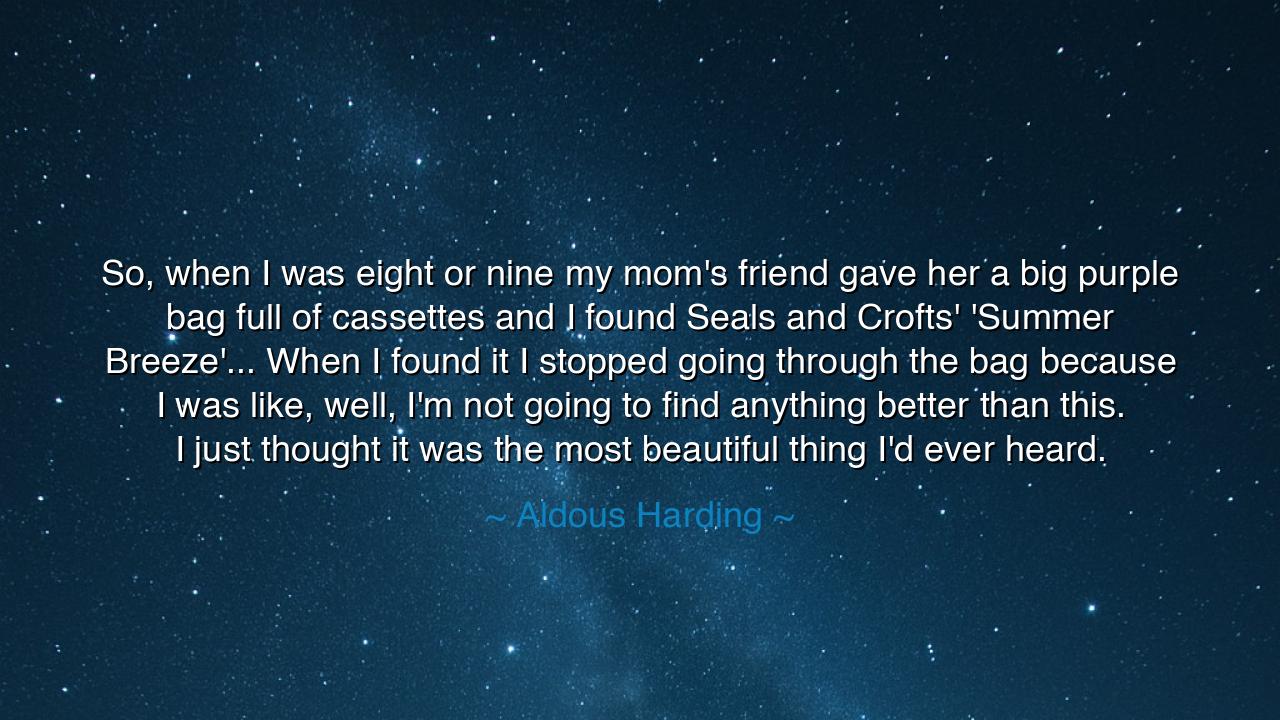
So, when I was eight or nine my mom's friend gave her a big
So, when I was eight or nine my mom's friend gave her a big purple bag full of cassettes and I found Seals and Crofts' 'Summer Breeze'... When I found it I stopped going through the bag because I was like, well, I'm not going to find anything better than this. I just thought it was the most beautiful thing I'd ever heard.






There is quiet wonder in the words of Aldous Harding, who said, “So, when I was eight or nine my mom's friend gave her a big purple bag full of cassettes and I found Seals and Crofts' 'Summer Breeze'... When I found it I stopped going through the bag because I was like, well, I'm not going to find anything better than this. I just thought it was the most beautiful thing I'd ever heard.” This moment, simple on its surface, is a revelation of the soul — the instant when beauty pierces through the noise of the world and awakens something eternal within us. In that childhood encounter with music, Harding discovered not only a song, but a truth: that beauty has the power to stop us, still our searching, and remind us that we have found something sacred.
The origin of this quote lies in a child’s innocent discovery of art — an encounter unclouded by ambition or expectation. The “big purple bag full of cassettes” becomes a symbol of abundance, of endless choices in the modern world. Yet the young Harding’s decision to stop searching after finding one perfect song speaks to an ancient wisdom: that fulfillment does not come from having everything, but from recognizing the one thing that moves the soul completely. To her, “Summer Breeze” was not just a melody — it was revelation, a moment when music and spirit became one.
Throughout history, humanity has been marked by such awakenings — moments when beauty interrupts life’s ordinary flow and transforms it. The philosopher Plato believed that beauty is the visible form of truth, a glimpse of the divine through the material. For him, to behold beauty was to remember something eternal, something the soul already knew but had forgotten. In that sense, the young Harding’s experience mirrors the awakening of the ancients — she was not merely listening to a song; she was remembering the language of harmony, the rhythm of being itself.
The story also reminds us that art chooses us as much as we choose it. Harding did not know why “Summer Breeze” struck her so deeply — only that it did. This is the mystery of all true inspiration: it arrives unexpectedly, yet it feels destined. So it was for Mozart, who, as a child, heard the music of his father’s violin and could not look away. In that sound, he recognized something that transcended the ordinary, something that would guide his entire life. In both cases — the prodigy and the young dreamer — the soul recognized its mirror in sound.
When Harding says she thought it was “the most beautiful thing [she’d] ever heard,” she captures that first brush with artistic ecstasy — the same feeling that drives poets, painters, and musicians to create. For what is art, if not the attempt to recreate that first encounter with wonder? The moment one hears a song that stops time, one begins a lifelong dialogue with beauty. Many will spend their entire lives seeking again that purity of feeling — that stillness where art and self become one.
There is also humility in her words. By saying she stopped searching the bag, Harding reveals the wisdom of contentment. In an age that teaches us to keep reaching, keep scrolling, keep consuming, her instinct to stop and simply listen is a radical act. The ancients would call this reverence — the ability to recognize something holy and be still before it. In the stillness of that childhood moment, she honored the truth that beauty does not need to be chased; it needs only to be received.
The lesson, my children, is this: when something moves your soul, do not rush past it. Do not demand more, or newer, or greater. Sit with it. Let it fill the silence until your heart learns its rhythm. The world will tempt you with a thousand cassettes — new songs, new pleasures, new distractions — but none can replace that one moment when beauty finds you and reminds you who you are.
So remember Aldous Harding’s wisdom: stop searching when you find something true. Whether it is a song, a friendship, a truth, or a calling — when your heart whispers, “I will not find anything better than this,” listen. For in that moment, you have touched eternity — and eternity, in its infinite grace, has sung back to you.






AAdministratorAdministrator
Welcome, honored guests. Please leave a comment, we will respond soon